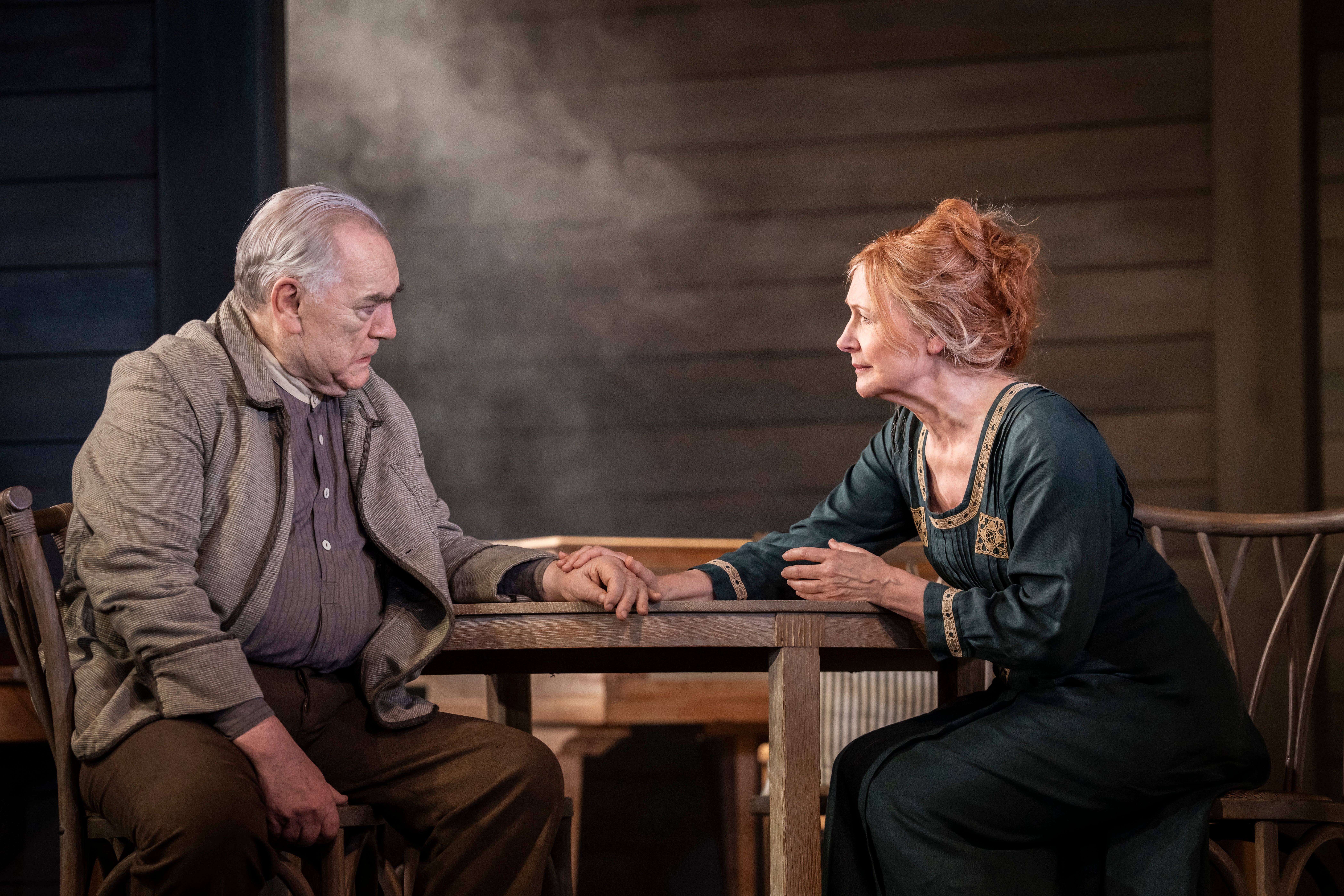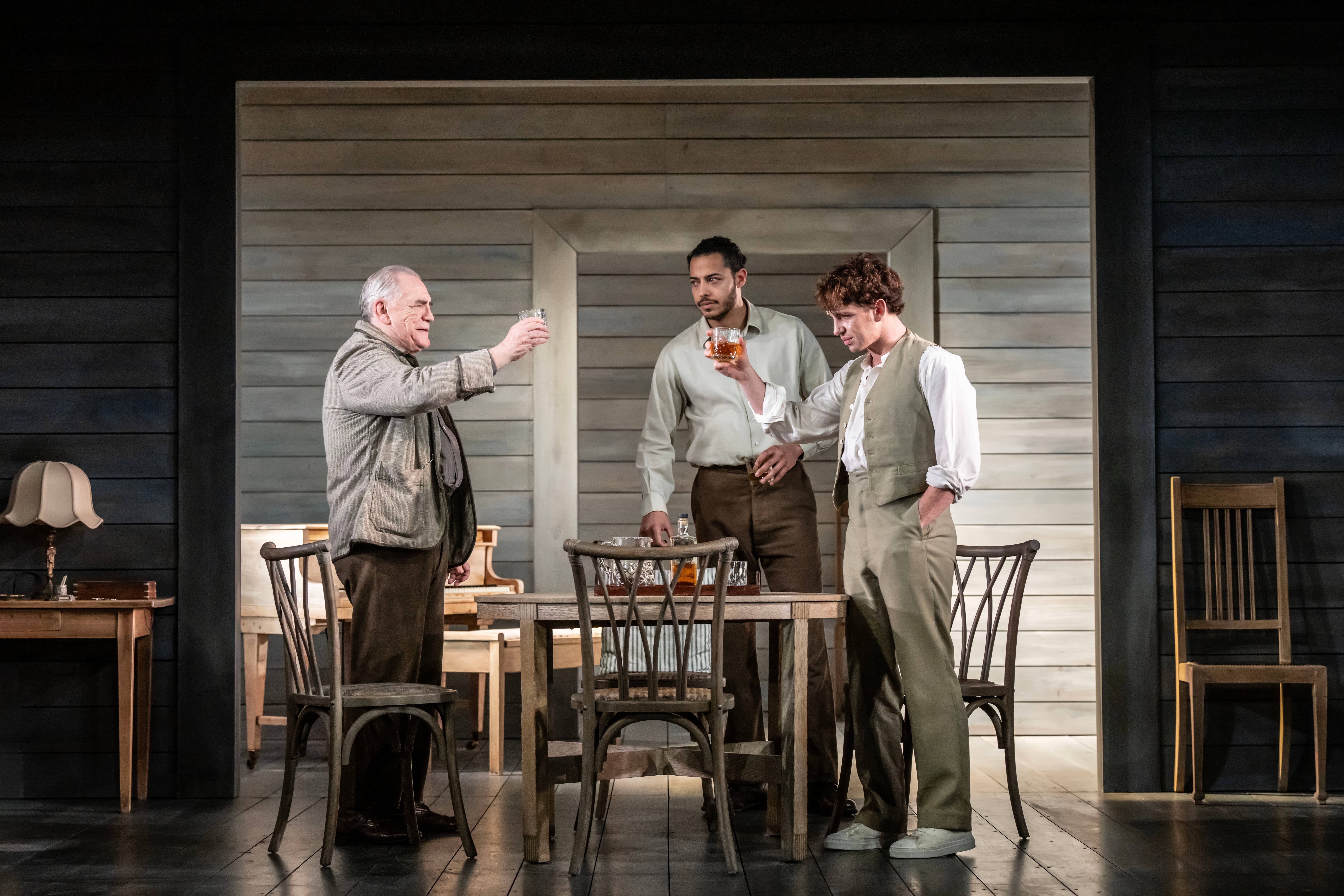Long Day’s Journey Into Night review: Brian Cox’s tyrannical Tyrone is a masterclass in impotent rage
The ‘Succession’ star returns to his stage stomping ground, and it’s where he stomps best. Alongside an extraordinary Patricia Clarkson, he owns the stage in Jeremy Herrin’s spare, bleak – and very long – revival of Eugene O’Neill’s masterpiece

God, this is a miserable play. For three and a half hours, the four members of the Tyrone family – a morphine addict, two alcoholics and a consumptive – shout and mope and recriminate, and director Jeremy Herrin really leans into the misery in his bleak, spare production of Eugene O’Neill’s masterpiece.
So why would anyone want to sit through 210 minutes of such sustained despair? Well, first there’s the acting. It’s one of those plays that needs a mighty pair in the lead roles of James and Mary Tyrone, he a once-famous actor who is now a whiskey-guzzling miser, she a bitter morphine addict. Lesley Manville and Jeremy Irons have done it, so have Charles Dance and Jessica Lange. This time it’s over to American movie star Patricia Clarkson and the beast that is Brian Cox as James, with Cox reminding us all, after the success of Succession, that the stage is his old stomping ground – and it’s where he stomps best.
There’s also the fact that, 85 years after it was written, Long Day’s Journey remains an incredibly astute account of addiction and of the impact it has on a family. “I’ve become such a liar,” says Mary. “I never lied about anything once upon a time. Now I have to lie, especially to myself. One day, long ago, I found I could no longer call my soul my own.”
It’s such a big machine of a play that it takes a while for the wheels to start moving, but once the initial creaks and jerks are out of the way, it’s an unrelenting plummet. It’s all there in the desolation of Lizzie Clachan’s set, three recessing rooms that get gloomier the further back you go. The few bits of furniture are all scrubbed to bare pale wood, the walls a washed-out grey, the lighting increasingly weak and white. With so little there, the production becomes a kind of specimen box, the Tyrone family like creatures under a microscope – and we watch them drive themselves to despair. Herrin turns this into a showcase for Big Acting, with no distractions.
Cox makes Tyrone a tyrant, barking and roaring, flaring into rage at the slightest provocation, simmering down just as quickly, and all the while his family don’t pay him the slightest bit of notice. He rages, Lear-like, impotent, and just as quickly becomes a tender husband, staring with deep love into his wife’s eyes.
Clarkson, meanwhile, has an extraordinary ability to flitter in and out of reality, sometimes just with her eyes. One moment they’re piercing into the person she’s talking to, fully lucid; the next they’re staring blankly as she loses herself in her memories. With just a faint smile, she becomes almost diaphanous, a drifting, spectral presence on stage. You can’t keep your eyes off those two.

Laurie Kynaston and Daryl McCormack take on the roles of the sons, Edmund and Jamie – one a morbid poet, the other a self-loathing alcoholic actor. The way they draw on threads of their parents is clever: Kynaston’s Edmund has some of the swagger of his dad, while McCormack’s Jamie has the same inwardness as his mum. Meanwhile, Louisa Harland (Orla from Derry Girls) does brilliantly as the Irish maid Cathleen, tuning down some of the elements that can make her character a comic stereotype.
By no means is this a perfect production. The stripped-back approach is really exposing, and there are moments when it doesn’t bear up to the scrutiny, especially in the whiskey-heavy later scenes. You miss the heft, too, when neither Cox nor Clarkson is on stage – less a criticism of the sons than a testament to the hypnotic skill of the parents – and some scenes in the second half feel bum-numbingly long. And it’s not exactly an enjoyable night out at the theatre, either. What it is, though, is very impressive, often mesmerising, and – when it hits right – profoundly moving.
Wyndham’s, until 8 June
Join our commenting forum
Join thought-provoking conversations, follow other Independent readers and see their replies
Comments
Bookmark popover
Removed from bookmarks